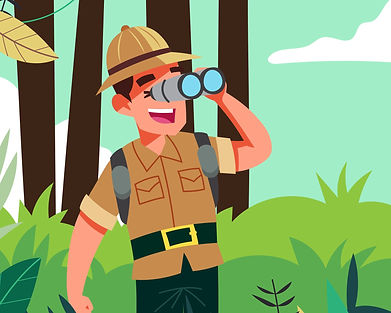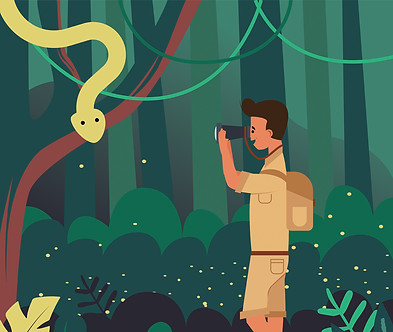

When we feel deeply connected to something, we develop an inclination to care and protect it as a result of our experiences.
We have designed learning programs for children from K -12. These curated first-hand engagement programs are designed with an intention to retain connection and continuity in their experiences at different levels & landscapes year on year and build lasting relationship with the natural world.
Our vision is to work with school communities whose students grow up to be environmentally conscious citizens who protect and preserve something they love.
Nature Connection
Programs
K-12
Our Passion and Vision

K-3 Sense of Wonder
The focus on environment based learning for children in grade k-3 is to cultivate a sense of wonder. This will be conducted in an informal space to explore and experience nature through:
-
Multi-sensory play,
-
Physical movements,
-
Touch,
-
Small actions and
-
Unregulated play in the local environment to develop a sense of connection with all their moving, flying and crawling friends
.jpg)
K-3 Sense of Exploration
The middle years of childhood is very important to develop childrens' relationship with their natural world. This exercise is designed to cultivate a sense of exploration by developing curiosity and excitement.
Children in grade 4 -6 children learn about their flying, crawling and moving friends:
-
What they feed on
-
How they communicate
-
Their shelter, contrasts and similarities between human/plant and animal.
The objective is to help them explore the inter - dependence of human-animal-plant life at an experiential level

K-3 Sense of Inquiry
Students in this age group are at the stage of decision-making and getting introduced to various career paths. Through this inquiry-based learning program, we aim to help students explore and reflect on the social, cultural, political and economic impacts and Influences on nature and how their responsible action and decisions in the future can make a difference to the environment.
Students will form smaller groups and each group will be mentored by a subject matter expert (ecologist)/local guide who has knowledge on the topic.
Student groups will inquire about the history of the chosen topic and the location - where the learning program is conducted and delve deeper into the subject and create a report along with the photographs and other visual aids, and exhibit it in the school premises for fellow students and members of the school
Mediums we use for experience


Drawing is a non- verbal way of expression & communication .
it plays a big role in childrens 'cognitive development. Drawing can help children to:
-
Learn to write and think creatively
-
Develop hand-eye co-ordination
-
Hone analytic skills and
-
Conceptualize ideas
Storytelling has long been the traditional way of communicating life experiences and the creative imagination enhancing listeners:
-
Imagination
-
Visualization Skills
-
Listening Skills
-
Language Skills
-
Memory Skills
-
Interpretation Skills
`If history were taught in the form of stories, it would never be forgotten".
~ Rudyard Kipling
Pic by megan quint
Pic google source
Drawing
Story Telling

Theater is great way for young children to bond with their peers. it builds their self-confidence, enhances self-expression and helps them cultivate empathy and compassion
Story Telling
Engagement Programs in the School
We aim to build a school community whose children develop passion for life, compassion for all living beings and graduate from the school to be engineers, lawyers, doctors, entrepreneurs, artists, policy makers and compassionate individuals who spread kindness and love, who take responsible and environmentally sustainable decisions in the future.
While the experiences conducted outdoors are designed to develop a connection with nature, the engagement programs we propose to conduct in the school are to help students retain the connection they have developed. This is done by engaging through visual, interactive and activity based programs.
The engagements programs are categorized according to age groups.
Our Proposal for Engagement Programs :
Foundation for sustainable environment is sustainable mind. We believe learning forgiveness and eliminating unpleasant emotions make space for emotions and experiences that are needed for emotional and spiritual growth of the children.
Studies have shown that most children carry powerful negative emotions like guilt, hurt, anger and resentment from from their childhood to adulthood.These come in the way of experiencing and expressing their true potential .These emotions not only hamper their self-confidence it also effects the relationship with others and with themselves.
We believe teaching self love and helping children to acknowledge their true internal nature in their childhood will act as a strong foundation in their adulthood. This will enhance their self - image, there by impacting their decision making and leadership skills.
Furthermore, it allows them to empathize and acknowledge others worth and ability, creating strong bond and relationships with people around them.
For K-6 Affirmations on self - love and forgiveness - 5 days a week - 2 mins per day
6-12 Interactive sessions and workshops with experiential educators on communication, forgiveness and identity
Workshops of forgiveness, self - love and acceptance
1. Emotional Environment
2. Guided Intervention programs in the school
For Grade K-3
Drawing, painting, storytelling
For Grade 3-5
Train evs Teachers to conduct season watch and bird watch sessions (observation & journal) in the school premises during EVS periods for students .
For Grade 6-10
a) Screening wildlife documentaries, discussions and interactions with ecologists and story telling in the school during the academic year to retain their experience and emotions for nature and create a strong community whose individuals grow up with similar value systems
b) Student led eco-community to monitor water, waste and energy
3. Relationships program for teachers and parents
Studies show the environment at school and at home, the influence of parents and teachers play a vital role in the lives of children
We propose to conduct a fun based inquiry session with the teachers and parents connecting them to their childhood, exploring their relationship with their parents and teachers and reflect upon their relationship with their children and students